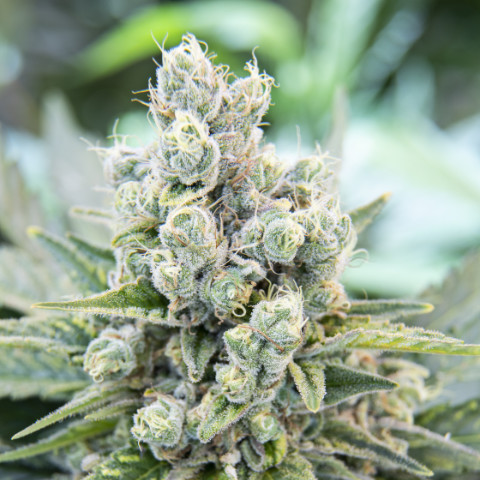
Episode 03
Cannabis and PTSD
The endocannabinoid system has arisen to have a crucial involvement in the regulation of anxiety and fear behaviour. Those symptoms are key in some psychiatric disorders, like post-traumatic stress disorder. PTSD is mainly characterized by hyperarousal, recurrent stressful memories, nightmares, and changes in mood such as anxiety and depression. The aim of this podcast is to review the connection between the endocannabinoid system and PTSD and to find out what is the potential of cannabinoids as a treatment.
During the research I have looked at existing studies, from anecdotal evidence and pre-clinical studies, to randomised controlled experiments. The investigation with animals has been fundamental to understand the underlying brain mechanisms of action in patients with PTSD. Researches have concluded that the unsuitable response to traumatic events is related to the process of extinction of aversive memories. As many studies proof, Cannabinoids can help improve the extinction of fearful memories. Therefore, they could be used in the treatment of PTSD patients. Moreover, researchers have found out that THC can significantly reduce the frequency and intensity of nightmares. There are several studies aiming to assess the efficacy and safety of the compounds present in cannabis in order to offer a suitable alternative for treatment-resistant patients.
Thanks to many optimistic scientists, the research into cannabis and PTSD symptoms is a promising field.

Episode 02
Cannabis in Chronic Pain
A report published in 2017 by (Klimkiewicz & Jasinska) The National Academy of Sciences, Engineering, and Medicine on The Health Effects of Cannabis and Cannabinoids concluded that “There is conclusive or substantial evidence that cannabis or cannabinoids are effective for the treatment of chronic pain in adults.” There is also strong experimental evidence demonstrating that THC can limit the amount of opioids necessary to reduce pain.
In the podcast ‘Cannabis in Chronic Pain’, we address commonly asked questions and put forward perspectives of two US-based scientists, Dr. Brian J Piper and Dr Michael E.
Schatman, on several aspects of cannabis use in chronic pain.
Dr. Schatman is a clinical psychologist who has spent the past 35 years working in
multidisciplinary chronic pain management. He currently holds faculty appointments at
Tufts University School of Medicine and the North Carolina State University’s School of
Social Work. One of his most noted publications is “Cannabis for Chronic Pain: Not Ready for Prime Time”(Carr & Schatman, 2019). This research suggested that at present, cannabis should not be considered an optimal choice as a drug for pain management.
On the other hand, Dr Brian J Piper, Assistant Professor of Neuroscience at Geisinger
Commonwealth School of Medicine, is a neuroscientist. He has published over 60 peer
reviewed manuscripts in leading journals such as Neuropsychopharmacology, the American Journal of Preventive Medicine, and Pain. He is part of the osteoarthritis research team supported by Eli Lilly and Pfizer, which has a grant in review with the Food and Drug Administration. One of his projects focussed on “Chronic Pain Patients’ Perspectives of Medical Cannabis”(Piper et al., 2017). His research has been supported by the National Institute of Drug Abuse, medical marijuana dispensaries, and non-profit patient organizations.
This podcast will focus on the following cannabis-related questions:
• Is there evidence of cannabis having pain relieving effects in fibromyalgia patients?
• What are the side effects of the commonly practised modes of cannabis intake?
• Is tolerance a concern with long term use of medical marijuana?
• Cannabis in chronic pain is one of the most widely researched topics in the field of
medicinal cannabis use for which the most evidence base exists, but why has it still not
been included in clinical guidelines?
• Can cannabis be recommended as medication for chronic pain patients?
References
Carr, D., & Schatman, M. (2019). Cannabis for chronic pain: Not ready for prime time.
American Journal of Public Health, 109(1), 50–51.
https://doi.org/10.2105/AJPH.2018.304593
Klimkiewicz, A., & Jasinska, A. (2017). The Health Effects of Cannabis and Cannabinoids.
In Psychiatria (Vol. 15, Issue 2). National Academies Press.
https://doi.org/10.17226/24625
Piper, B. J., Beals, M. L., Abess, A. T., Nichols, S. D., Martin, M. W., Cobb, C. M., &
DeKeuster, R. M. (2017). Chronic pain patients’ perspectives of medical cannabis. Pain,
158(7), 1373–1379. https://doi.org/10.1097/j.pain.0000000000000899

Episode 01
Nutritional Value of Hemp in the Human Diet
The plant Cannabis sativa is widely known for its psychoactive effect mainly caused by the phytochemical tetrahydrocannabinol (THC). Apart from the medicinal use of marijuana strains with high concentrations of cannabinoids, hemp strains of the same plant species can be used to produce renewable resources and natural food products without any psychoactive effect. A rich amino acid profile, a high concentrations of poly unsaturated fatty acids, vitamin E, and other micronutrients, as well as high amounts of complex carbohydrates identified hemp seeds as a nutritious source in the human diet. Particularly in alternative diets, such as vegetarian, vegan, or gluten-free diets, hemp seeds can contribute to meeting the requirements for several different nutrients.
If you are interested in the details of our research outcome or wonder why there are so few food products based on hemp on the market, listen to our scientific podcast episode. We reviewed existing studies on the topic to evaluate the potential of hemp as a dietary source in the human diet. In addition, we interviewed Prof. Dr. Matt McSweeney, from the Acadia University of Nutrition and Dietetics in Canada, who researched on the suitability of hemp flour in baking products and spoke to the Federal Ministry of Food and Agriculture in Germany to evaluate both future possibilities and obstacles of using hemp in the human diet.